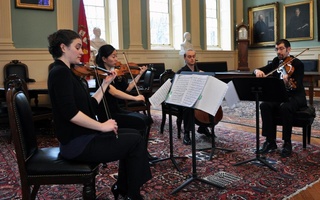Despite the proverbial security of the “Harvard bubble,” homelessness is one social problems that Harvard students encounter every single day. A stroll down Massachusetts Ave. or a trip to the CVS brings you face to face with the pervasive homelessness that exists right outside the gates of the richest higher education institution in the world.
Bread and Jam, a daytime, drop-in shelter here in Cambridge, works to improve the situation by providing food and shelter to those who need it. After decades in operation, that shelter will close its doors on March 25, 2014. Changes in federal funding—which will now prioritize permanent housing solutions over street outreach—meanthat many programs helping the homeless right outside our door are being shut down. While we admire the federal government’s efforts to fund permanent housing for the homeless, the corresponding shift of funding away from daytime shelters like Bread and Jam will literally leave people out in the cold. Now, more than ever, it’s important that both students and governments to make eradicating homelessness a priority.
According to the City of Boston Homeless Census, 85 percent of both temporarily and chronically homeless people in Boston suffer from a mental illness, a disabling condition, substance abuse, or a physical disability, all of which require support and attention from society. Daytime shelters like Bread and Jam provide much of that support, and they are already strained and overflowing, unable to provide services to all those who need them. The closing of Bread and Jam will therefore be keenly felt among Cambridge’s homeless population. The only other such program in the Square is Youth on Fire, a drop-in center for homeless individuals under 24 years of age that is located near the law school. Yet that shelter too will soon leave the Square: It plans torelocate to Central, also citing cuts in federal funding.
The closing of Bread and Jam will exacerbate the already pervasive problem of homelessness, and both students and the government should prioritize ensuring that all people have access to safe shelter. For the government, this can mean re-examining policies that shift funding from street shelters without guaranteeing a replacement to fill the void. For students, making a difference can mean volunteering at the Harvard Square Homeless Shelter, which is run and staffed primarily by College students through Phillips Brooks House. We should all try to be more cognizant of the issue and redouble our efforts to make homelessness a thing of the past.
Read more in Opinion
A Matter of OpinionRecommended Articles
-
Two CambridgesThough we do not know great famine in this country, we know homelessness, abject poverty, and the misery and suffering which accompany them. In this country and in this city, people still feel the aches of hunger, want, and fear.
-
 Pfoho to Musicians: Let's Start at the Very Beginning
Pfoho to Musicians: Let's Start at the Very Beginning -
Homeless Invited to Speak in LectureA typical Harvard course may host renowned authors, environmentalists, and politicians from around the world, but the speakers featured in Thursday’s Sociology 149: “Inequality, Poverty, and Wealth in Comparative Perspective” spend most of their time on the streets right outside the campus gates.
-
Education and ApplicationUltimately, a good education does not prove itself in a test, but instead in practical application and in the inexhaustible effort to continue to learn.
-
Homeless in Harvard SquareIt is easy to scoff at the excuses that some homeless use to wring some money out of you. However, there may be more to their claims than most of us give them credit for.
-
Why is a Card-Carrying Homosexual Democrat Running Logan Leslie’s Campaign?I serve as Logan Leslie’s campaign manager not because he’s an expert on homelessness, crime, or city politics. I work for him because he’s an expert at listening to others, and he’s dedicated to representing the interests of all Cambridge’s residents—including students, homeowners, and the homeless.













